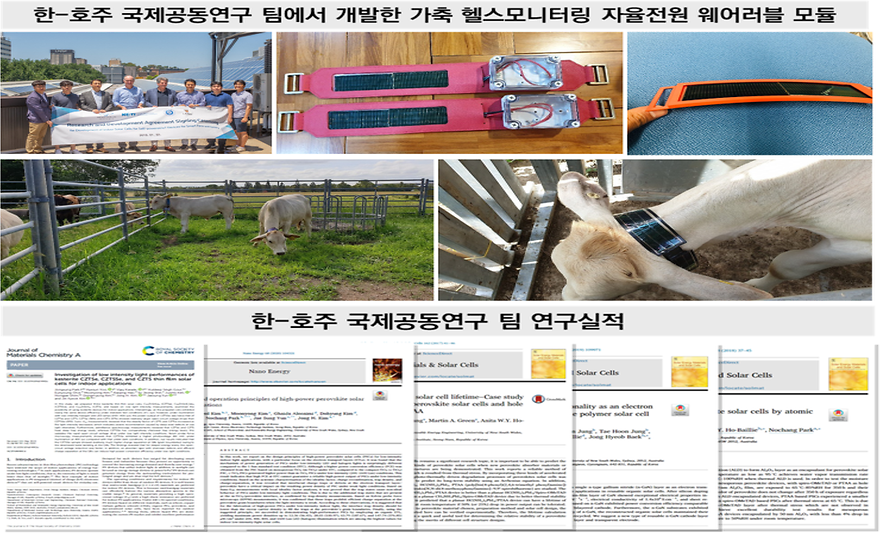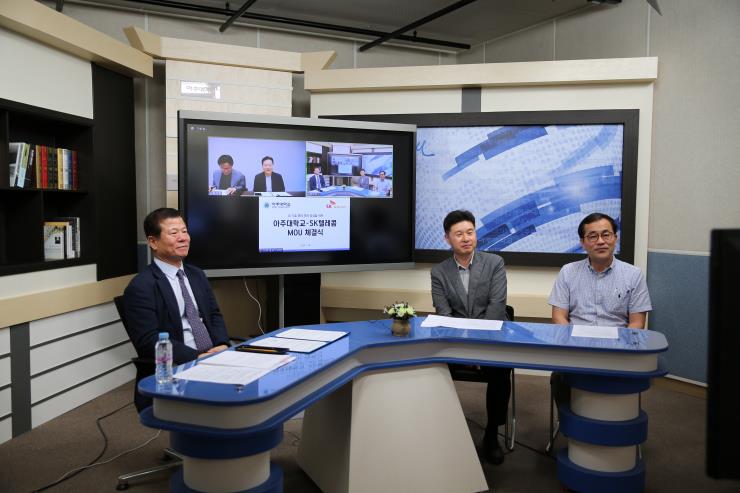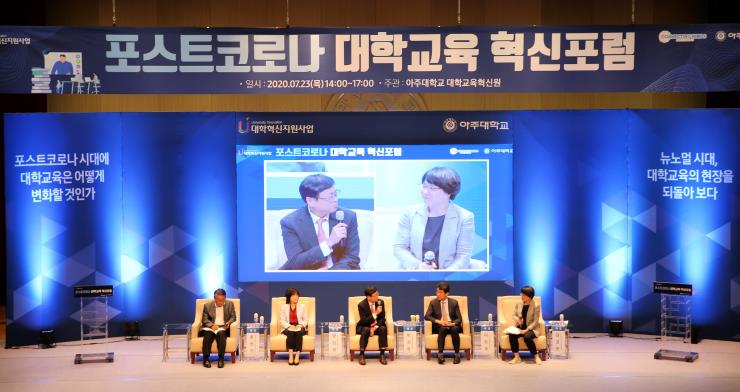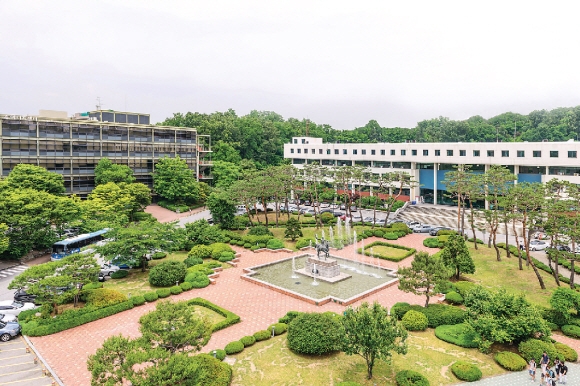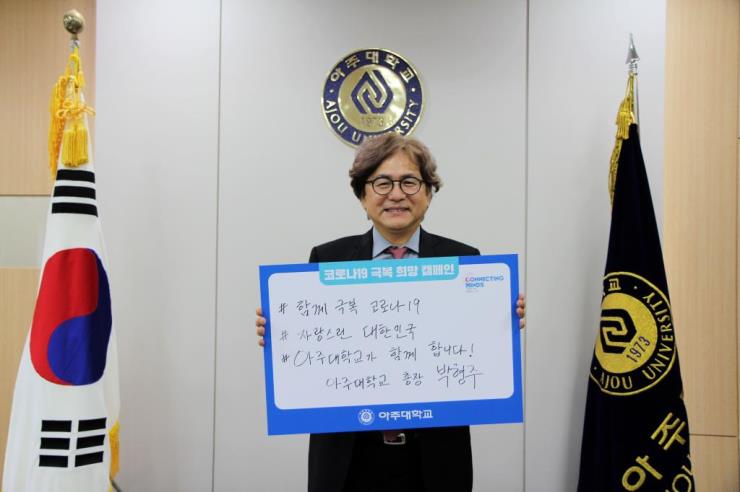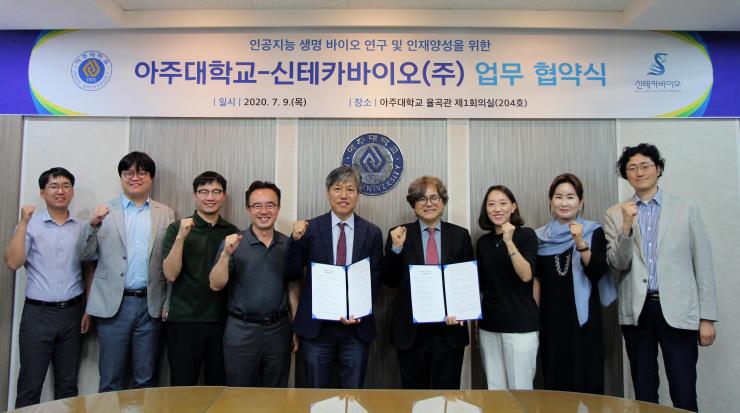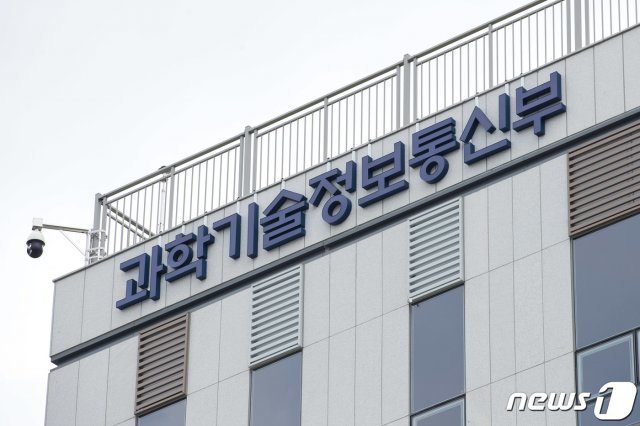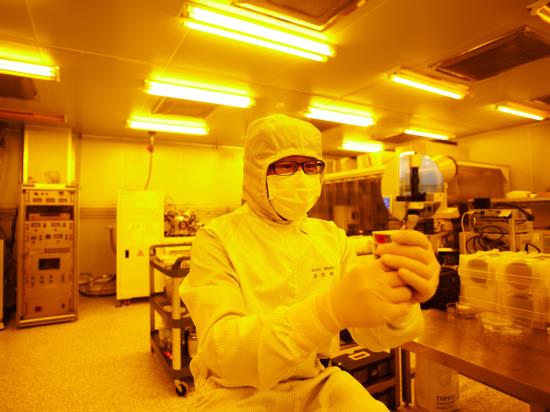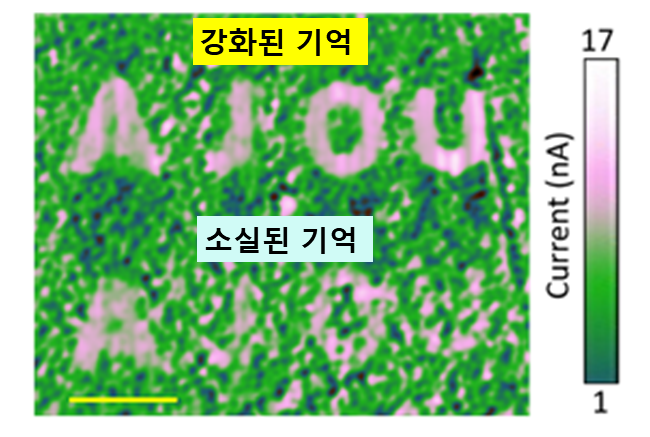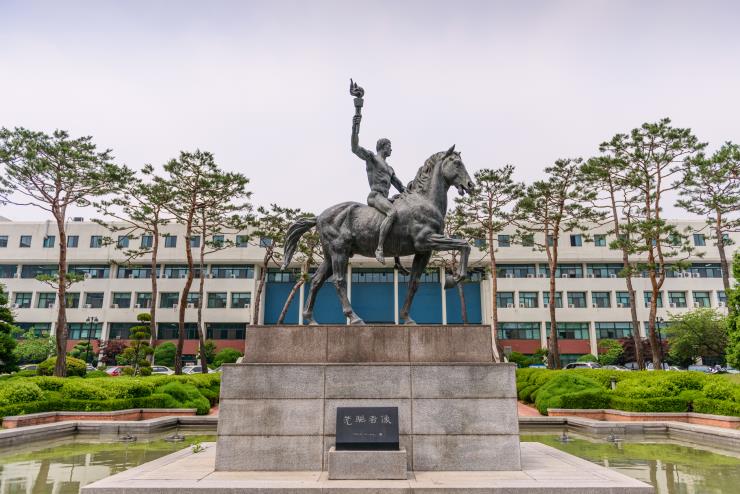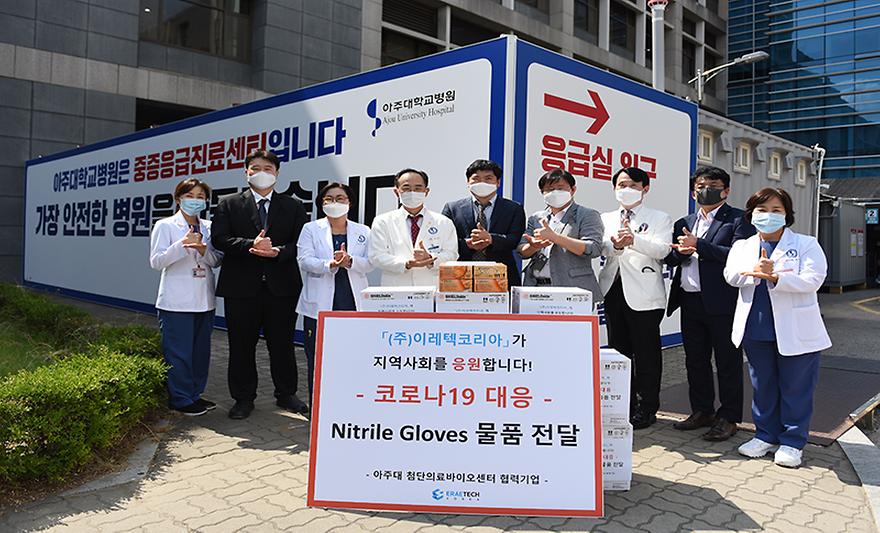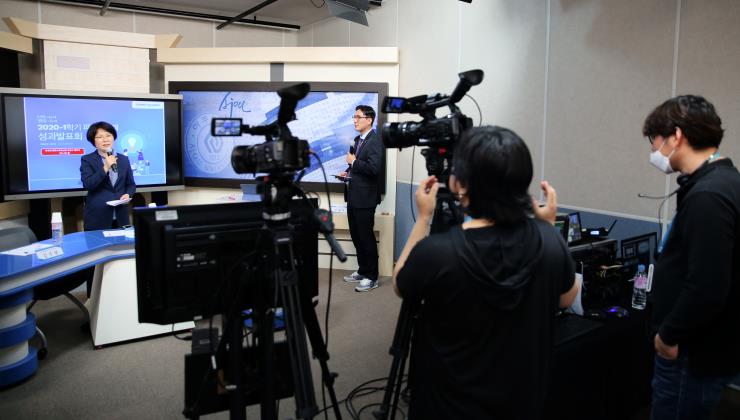-
* Self-powered wearable module for diagnosing livestock health, developed by a team of Korean and Australian researchers* Joint research by Korean and Australian researchersA team of researchers led by Professor Kim Jong-hyun (Department of Applied Chemistry and Biological Engineering/Graduate Department of Molecular Science and Technology), working together with a team of Australian researchers, succeeded in developing the core technology for a self-powered wearable module for diagnosing livestock health. The technology is expected to aid in the development of a cutting-edge digital platform that allows large livestock farmers to diagnose and manage the health of their livestock in real time.The results of the research collaboration, entitled “Investigation of Low-intensity Light Performance of Kesterite CZTSe, CZTSSe, and CZTS Thin-film Solar Cells for Indoor Applications,” were published on the online issue of Journal of Materials Chemistry A (IF = 11.301, JCR top 6.7%) on July 21. The authors include researchers from Ajou University, the Green Energy Institute, Chonnam National University, and the University of New South Wales.The researchers discovered the mechanism of a CZTSSe-based solar cell that can be used in a variety of low-light settings. CZTS-based thin-film solar cells are affordable and eco-friendly light absorbers, and are expected to lead to the development of a better alternative to existing solar cells, which are expensive and made of environmentally harmful heavy metals. Although CZTS-based solar cells have been known to boast superior conversion efficiency in outdoor settings with abundant sunlight, little research has been done on how effective they are in low-light settings, such as overcast weather and indoor environments.The researchers thus set out to develop a CZTSSe film that could be used in a variety of low-light environments, and proved that such film could produce enough electricity to run Internet-of-things (IoT) sensors even in low-light settings. In other words, their CZTSSe thin-film solar cell demonstrated the capability for application to self-powered IoT sensors of various types used in either indoor or outdoor settings.Timely and accurate diagnosis and projection of livestock diseases, including swine fever and foot-and-mouth disease (FMD), based on efficient monitoring is crucial to the containment of contagious animal diseases as well as the welfare of animals. Members of Professor Kim’s team have been working together on multiple projects over the years to develop effective livestock health monitoring systems through collaboration with industries and academic institutions worldwide. The team has included members from Ajou University (Professor Kim), Chonnam National University (Professor Kim Jin-hyeok), Korea Electronics Technology Institute (Dr. Kim Jin-cheol and Dr. Park No-chang), Green Energy Institute (Dr. Park Jong-seong[KHTC1]), Daeyeon C&I Inc., and University of New South Wales and University of Queensland, both in Australia.This global team has been searching for ways to create a wireless, standalone power system that can reliably supply electricity irrespective of the differences in livestock farming environments. Since developing a self-powered wearable module sensor for livestock health assessment, the researchers have been testing it in Australia.The key to making a device like this possible lies in a solar cell that can be used in both outdoor and indoor environments. To this end, the team first developed a perovskite solar cell with superior output, and published their study in Nano Energy, a widely cited academic journal, in February 2020. The team had also been researching encapsulation technology to ensure the actual applicability of the solar cell they developed, and had their findings published in Solar Energy Materials & Solar Cells in December 2018.Professor Kim explained, “We have developed a wireless, self-powered, wearable sensor module based on our earlier studies, and are now testing it on cattle on a farm in Brisbane. We plan to expand our trial to include large-scale farms in other regions of Australia.”The team regularly organizes their own meetings and exchanges to facilitate better understanding of the technological demands of large livestock farms in Australia and develop solutions accordingly. A leader in advanced livestock and agricultural technologies, Australia has a significant stake in developing reliable solutions for diagnosing livestock health so as to help farmers protect and increase their income. The researchers are now planning to expand the scale of their experiment in Australia with additional support promised by the city of Narromine and its mayor, Craig Davies, in New South Wales.Professor Kim remarked, “When we succeed in developing the final product based on our wearable livestock health diagnosis module, it will very likely find a welcoming market in the Australian livestock industry. We intend to add the big data from our continuing trials and the AI-based model of analysis we are developing to our study and build diagnostic and monitoring platforms by country and livestock species.”The team’s research has been aided by the International R&D Collaboration Program (P0006857) of the Ministry of Trade, Industry and Energy and the Korea Institute for Advancement of Technology, as well as the Korea-Oceania Collaboration Infrastructure Development Program (NRF-2018K1A3A1A17081404) of the Ministry of Science and ICT and the National Research Foundation of Korea.
-
446
- 작성자OI***
- 작성일2020-08-10
- 13508
- 동영상동영상
-
-
444
- 작성자OI***
- 작성일2020-08-10
- 12565
- 동영상동영상
-
Ajou University organized the Post-COVID-19 University Education Innovation Forum and supported debates on how university education should change in the post-pandemic future.Organized by the Ajou University Center for University Education Innovation, the forum was held online, starting at 2 p.m. on July 23 and broadcast via YouTube livestream.Assistant Dean Paul Kim of the Stanford Graduate School of Education was featured as the first keynote speaker, sharing his ideas on post-pandemic education innovation. Kim spoke about how Stanford University has been responding to COVID-19, and what it could imply for the future direction and strategy of higher education.Forecasting that the future of education will be more “coaching” than “teaching,” Kim stressed the need to develop a curriculum that takes into account the differences in interests and capabilities among students and seeks to maximize students’ potential.”Kim also discussed the Stanford Mobile Inquiry-Based Learning Environment (SMILE), emphasizing that genuine study and academic exploration involves raising bold questions and relentlessly debating them. He argued that future leaders enroll in university not for the degrees but out of empathy and devotion, with a willingness to learn and experience so that they can change the world.In order for this kind of education to be possible, Kim emphasized, the culture of educational institutions should first be changed in innovative ways. He stressed the need for “culture engineering” based on strong leadership and organization, citing Google as an example of successful culture engineering.Lee Ju-ho, professor at the KDI School of Public Policy and Management and former Minister of Education, shared his thoughts on AI revolution in education and the destructive innovation of universities as the next keynote speaker. Professor Lee predicted the rise of education customized to the needs of individual students.Projecting that personalized learning will be made possible by the rise of “edutech,” led by artificial intelligence (AI), Professor Lee emphasized that teachers would also become learning planners.A series of presentations and panel discussions followed, featuring Park Hee-deung, head of the Budget and Planning Office and the University Innovation Support Program Group at Korea University; Yang Im-jeong, head of the Education Innovation Office at Pusan National University[KHTC1]; Hong Won-ki, head of the Innovation Center for Education at POSTECH; and Kang Kyung-ran, head of the Kang Kyung-ran, head of the Center for University Education Innovation at Ajou University. The speakers shared other universities’ examples of dealing with COVID-19 and its impact on education, such as: Korea University’s NeMo Class for online and offline lectures; Pusan National University’s PLATO, an online platform for knowledge-sharing; POSTECH’s virtual- and augmented-reality learning environment and real-time video-conferencing of lectures; and Ajou University’s “New Normal” education model and adaptive learning.In his greeting to the participants, President Park Hyung-ju of Ajou University explained that the forum was organized to share the “trial and error” of this year’s spring semester and prompt debates on the proper future direction of higher education in Korea. He expressed his wished that the forum would occasion reaffirmation of the role and utility of higher education and a gathering of likeminded people who share the same macro-level concerns.Paul Kim (Assistant Dean, Stanford Graduate School of Education)Park Hyung-ju (President, Ajou University)
-
442
- 작성자OI***
- 작성일2020-08-10
- 12779
- 동영상동영상
-
Having earned KRW 2.6 billion in revenue from technology transfers last year, Ajou University came in ninth among all universities compared nationwide.The rankings were announced as part of the Ministry of Education (MOE)’s University Information Disclosure in June 2020, which detailed how much Korean universities earned from technology transfers and related contracts in 2019. A total of 416 schools, including 224 universities, 147 vocational colleges, and 45 graduate universities, share information on 62 subjects in 14 categories (including school status, student body, faculty, and finance) through this disclosure.The annual revenue Ajou generates from technology transfers has been rising steadily, from KRW 1.18 billion in 2016 to KRW 1.96 billion in 2017, KRW 2.14 billion in 2018, and KRW 2.63 billion in 2019. The revenue consists of the money that businesses pay to the university in exchange for intellectual property rights to the research and development results of the university’s research teams.Ajou provides a great interdisciplinary research environment, as almost all of its colleges—Engineering, Natural Sciences, Medicine, Pharmacy, and Nursing—are located on the same campus, facilitating collaboration among researchers. Moreover, the university participates in a variety of policy grant programs that support the marketization of new technologies throughout the technology life cycle, from patent search to ownership transfer. Ajou has also continued to participate in the Bridge+ Program (MOE and National Research Foundation of Korea), Patent Gap Fund Program (Korean Intellectual Property Office and Korea Intellectual Property Strategy Agency), and Technology Management Consulting (TMC) Program [KHTC1](Ministry of Science and ICT and COMPA).In March this year, Ajou expanded the Technology Transfer Center [KHTC2]to create the Technology Marketization Division[KHTC3], staffing it with patent attorneys, technology transfer agents, and certified valuation analysts, to provide a comprehensive range of support for successful marketization.Technology Transfer Revenue Rankings, 2019RankUniversityRevenue (million KRW)1KAIST10,1832Seoul National University8,8353Korea University5,4194Sungkyunkwan University4,4725Kyung Hee University4,2716Yonsei University4,0487Hanyang University3,0398Pusan National University2,7219Ajou University2,63010POSTECH2,48011Kyungpook National University2,472Average nationwide: KRW 760 million* Source: MOE (June 2020), University Information Disclosure.
-
440
- 작성자OI***
- 작성일2020-08-10
- 12873
- 동영상동영상
-
-
438
- 작성자OI***
- 작성일2020-08-10
- 11620
- 동영상동영상
-
Ajou University has entered into a new partnership with Syntekabio Inc., an up-and-coming pharmaceutical company specializing in artificial intelligence (AI) and genomic big data. The ceremony for signing the partnership agreement was held in the Yulgok Hall on July 9 and attended by President Park Hyung-ju of Ajou University, CEO Jeong Jong-seon of Syntekabio, and other members of both organizations. The two parties agreed to apply AI to biotechnology to contribute to the further progress of the field while also working closely together to train and develop personnel specialized in biotechnology-AI convergence. In particular, the Department of Artificial Intelligence and Data Science at Ajou’s General Graduate School and the Ajou Center of Mathematical Statistics for Industries (ACMSI) [KHTC1]will lead the efforts to be made under the partnership, including: (1) joint development and management of an AI convergence-tailored curriculum catering to the needs of the biotech industry; (2) conducting of joint research on subjects of biotechnology-AI convergence; (3) organization of joint use of facilities and equipment; (4) provision of short- and long-term internship opportunities for graduate students; (5) granting of preference to Syntekabio in the hiring of graduates; and (6) organization of various projects for collaboration (including marketization and consulting) and exchange. Syntekabio had its initial public offering on KOSDAQ in December. The pharmaceutical company applies its advanced AI solution, DeepMatcher™, to a number of its own and collaborative pharmaceutical R&D programs. The company owns a variety of other AI-based new drug development solutions and provides genome-based precision medical services for hospitals. Ajou President Park commented, “Ajou is actively leading research on data science, and we expect this partnership to present our students with new opportunities to develop their capabilities.” Syntekabio CEO Jeong replied, “I expect mutually beneficial results through this partnership with Ajou University, which is a major center of active AI and related research in Korea today.”
-
436
- 작성자OI***
- 작성일2020-08-10
- 12042
- 동영상동영상
-
Along with Seoul National University, Ajou University was selected as a new beneficiary of the Support Program for Science and Technology Policy Graduate Schools, organized by the Ministry of Science and ICT (MSIT). Chosen universities can offer master’s and doctoral programs, beginning in the spring semester of next year, in science and technology policy. On July 7, the MSIT announced its selection of Ajou University and Seoul National University as the new beneficiaries of the program, with each beneficiary now eligible to receive up to KRW 1.7 billion in total over six years (three years first and renewed for another three years). Ajou will tailor its new graduate programs to workforces already active in industries, particularly in partnership with businesses in Pangyo Techno Valley, Gwanggyo Techno Valley, and Dongtan Techno Valley. Moreover, the university plans to increase its research collaboration with governmental research institutions, the Massachusetts Institute of Technology (MIT), and Tsinghua University on matters of science and technology policy, including environmental technology and information and communications technology. The MSIT has been supporting science and technology policy studies at graduate schools since 2011. Hanyang University, Korea Advanced Institute of Science and Technology (KAIST), and the University of Science and Technology (UST) were the beneficiaries of the first phase of the program, which lasted from 2011 to 2017. Chungnam and Pukyong National Universities are subjects of the second phase (2016-2023).
-
434
- 작성자OI***
- 작성일2020-08-10
- 11896
- 동영상동영상
-
Ajou Gap Fund 2020, an initiative launched by Ajou University to support the marketization of university-owned technologies with strong prospects, has chosen the projects to receive the fund’s support. The eight finalists will receive financial aid for the development of prototypes and technological marketing for the marketization of their technologies and successful entrepreneurship. The candidate projects were first reviewed on the basis of submitted documents and then subjected to a review by the fund’s operating committee. The chosen projects will receive up to KRW 50 million each in vouchers that can be spent to secure data and produce prototypes. The chosen projects seek to develop: (1) a process for manufacturing a location-specific antibody-drug conjugate using a non-variant antibody (led by Yoo Tae-hyeon); (2) a gentian extract-based active ingredient for treating arthritis (led by Jeong Seon-yong); (3) cosmetic products based on proteins derived from deer antler (led by Kim Joo-hee); (4) on-site diagnostic kit for sampling high-density virus genes (led by Park Seong-jun); [KHTC1](5) cancer therapy based on inhalation of phytoncide and mediated by natural killer cells (led by Jo Han-tae); (6) possible change in the drug regime for cancer therapy based on analysis of the efficacy of Metformin on PTPRD-gene-dormant cancer (led by Lee Da-keun); (7) application for contactless exercise rehabilitation (led by Yun Seung-hyun); and (8) nanotunnel carcinogenic delivery system (led by Park Young-joon).Ajou University launched the Gap Fund last year with the aim of facilitating and catalyzing the transfer and marketization of technologies invented at the university. The fund provides financial resources with which researchers can test the applicability of their inventions and market and develop their portfolios so that they can transition to successful entrepreneurship. Part of the profits generated by the marketed technologies are returned to the fund for its continued operation. In its first year, the Gap Fund selected and supported three projects. This year, N4U, the joint technology holding company led by Ajou University, has been chosen by the Korean Intellectual Property Office (KIPO) to manage the Patent Gap Fund and lead technology marketization programs. By adding this new support from the KIPO to the existing account of the University Innovation Support Budget, Ajou University was able to increase the number of projects supported and the amount of support provided by more than twofold. The university seeks to use the Ajou Gap Fund to minimize the gap between university-owned technologies and technologies demanded by industries, thereby boosting the success of marketization and reinvesting the profits thus generated. On the University Innovation Support Program Annual Evaluation conducted by the Ministry of Education and the National Research Foundation of Korea last month, Ajou University garnered an “A,” the highest grade. The Ajou Gap Fund was assessed, along with Blue Semester Extreme and Ajou IE Corp, as one of the excellent examples of university innovation support.
-
432
- 작성자OI***
- 작성일2020-08-10
- 11705
- 동영상동영상
-
Professor Seo Hyung-tak’s team has succeeded in developing a nerve-emulating artificial synapse, raising expectations for the creation of a high-density artificial synaptic platform that emulates the synapse, the fundamental structure for nerve signal transmission in organisms.Professor Seo (Department of Materials Science and Engineering/Graduate Department of Energy Systems, pictured) has disclosed that his team has successfully developed a nano-scale artificial synapse that simulates actual nerves, and identified its mechanism. The team’s study, entitled “Brain-like Spatiotemporal Information Processing with Nanosized Second-order Synaptic Emulators: ‘Solid-state Memory Visualizer’,” was published on June 27 on the online edition of Nano Energy (IF = 16.602). The team included Professor Park Ji-yong (Department of Physics), Professor Kim Sang-wan (Department of Electrical and Computer Engineering), and Dr. Mohit Kumar. The synapse, which forms the basic unit of the brain, connects neurons to enable the transmission of signals between them. Nerve cells are able to communicate because synapses exchange neurotransmitters. In recent years, research on the development of artificial synapses using various new materials has been growing.The von Neumann architecture, which has been frequently used in research of this kind, has been found wanting in terms of energy efficiency and speed. The architecture transmits information from the memory to the central processing unit (CPU) for sequential information processing. As a result, the memory becomes prone to bottlenecks, slowing down the processing speed, increasing energy demand, and complicating the differentiated retrieval of information reflecting different intensities of spatiotemporal information.Unsurprisingly, there has been much demand for a nanosized artificial neural network capable, like synapses, of processing information with little electricity, controlling short- and long-term memory in response to the strength and duration of the given stimuli, and integrating memories in high density. Developing such a device, of course, requires an accurate understanding of how individual synapses function.Professor Seo’s team attempted to develop an artificial neural network using a heterogeneous-structured artificial synapse that combines nickel oxide (NiO) and zinc oxide (ZnO). The conjoined surface of these compounds controls the chemical effects of the materials and emulates the ion-based neurotransmission of actual nerves. Using this mechanism, the team successfully created a deliberate surfactant defect to serve as a receptor of electrons, allowing them to store and control, in the defect, electrons moved by external stimuli to emulate the short- and long-term memory of human synapses.Professor Seo explained, “While our method is similar to how non-volatile flash memory devices, widely used today, store information, our product is distinct in that it can control the stored information in response to the intensity or duration of input signals.” He went on to add, “This technology allows us to emulate all the typical properties of actual synapses and neural networks.”Furthermore, by making effective use of the homogenous resistant switching movements of their artificial synapse, the team has proven that the size of an artificial synapse can be reduced to 40 nanometers (1 nanometer = 1x10-9 meters) with the help of conductive atomic force microscopy (CAFM). This size is similar to that of an actual synapse.The team has also confirmed that their artificial synapse is capable of not only functioning stably, but also supporting the parallel connection of innumerable artificial synapses to enable multi-stage signal processing and real-time learning rules (Bienenstock, Cooper, and Munro rules), which are crucial to artificial intelligence, at the nanoscale.Professor Seo said, “A human brain is a bundle of nearly 100 trillion synapses connected in a parallel circuit. To develop an AI system with artificial synapses, each individual synapse must be capable of emulating the human brain’s mechanism for learning and processing multi-stage signals.”He also remarked, “Our latest finding successfully identifies how artificial synapses, using nanoscale oxides, can emulate the functioning of actual synapses. We expect that this discovery will contribute to the development of a high-density AI platform.”The team’s research was conducted with support from the Future New Material and Original Technology Development Program and the Basic Research Support Program for Experienced Researchers, provided by the Ministry of Science and ICT (MSIT) and National Research Foundation of Korea.(Above) Image of reinforced memory, based on well-preserved and accumulated electric charges from strong signals(Below) Image of lost memory due to poor storage of electric charges from weak signals
-
430
- 작성자OI***
- 작성일2020-08-10
- 11713
- 동영상동영상
-
This year, Ajou University came in 90th place on the QS Top 50 Under 50 rankings. In addition to ranking all universities worldwide annually, Quacquarelli Symonds (QS) also ranks new and emerging universities less than 50 years old. Ajou was ranked between the 91st and 100th places, stepping up from the 101st to 150th league in which it found itself last year. Nanyang Technological University in Singapore topped the Top 50 Under 50 list this year, followed by Hong Kong University of Science and Technology. Of Korean universities, the Korea Advanced Institute of Science and Technology (KAIST), Pohang University of Science and Technology (POSTECH), and Gwangju Institute of Science and Technology (GIST) found themselves among the top 50 (ranking 3rd, 7th, and 30th, respectively). QS has been announcing the Top 50 Under 50 rankings since 2012. The company disclosed the list of the top 150 universities under 50 this year. The QS World University Rankings assesses over 5,500 universities worldwide every year. Ajou was ranked in the 551st to 560th range this year, climbing up over 100 places from two years ago and showing the most dramatic rise among all Korean universities. QS World University Rankings ranks universities worldwide across four categories—research, education, globalization, and graduates—using six metrics. Academic reputation, based on the opinions of over 100,000 researchers and scholars worldwide (40 percent) and employer reputation, based on assessment by over 50,000 industry insiders (10 percent), together make up 50 percent of the score. The other metrics are faculty-student ratio (20 percent), international faculty ratio (five percent), international student ratio (five percent), and number of citations per faculty (20 percent) based on the SCOPUS database. The Massachusetts Institute of Technology (MIT) topped this year’s rankings, followed by Stanford University, Harvard University, the California Institute of Technology (Caltech), and the University of Oxford. The National University of Singapore (11th) was the highest-ranking Asian university, followed by Nanyang Technological University (13th), Tsinghua University (15th), the University of Hong Kong (22nd), and Peking University (23rd). # Click to see QS Top 50 Under 50 2021# Source of photograph: QS website
-
428
- 작성자OI***
- 작성일2020-07-07
- 13901
- 동영상동영상
-
ERAE TECH, one of the “family enterprises” of Ajou University’s LINC+ Group, brought 10,000 pairs of surgical-grade nitrile gloves to the COVID-19 diagnostic station at Ajou University Medical Center as a donation. The donation was the result of a meeting between ERAE TECH CEO Lee Hyeong-seok, who is currently enrolled in the Graduate School of Clinical Pharmacy and Pharmaceutics, and Professor Kim Mi-ran, a doctor (Department of Obstetrics and Gynecology) at the medical center, who is herself a graduate of the same school. The brief ceremony that was held before the donation was made, on June 10, featured Lee, Chairperson Han Sang-uk of the medical center, and Dean Kim Su-dong of the Graduate School of Clinical Pharmacy. Lee explained: “We wanted to do something for our hardworking medical practitioners who are working so hard at the COVID-19 diagnostic station, and thought the best thing to do was bring something useful, like 10,000 pairs of nitrile gloves.” The Industrial Cooperation Centers (ICCs) at Ajou University were established with the mission of promoting the university’s research strengths in partnership with local businesses. Faculty members and local firms participate in R&D projects on biotechnology and healthcare, smart mobility, new and renewable energy, and artificial intelligence (AI) and big data. Ajou continues to aid local businesses by providing a wide range of support, including R&D infrastructure, advice, and personnel training support.
-
426
- 작성자OI***
- 작성일2020-07-07
- 10790
- 동영상동영상
-
Chairperson Kang Kyung-ran of the Center for University Education Innovation greets the audience. The first Paran Semester for the academic year of 2020 has finally come to an end, and the results of the semester were shared via a YouTube livestream. A total of 60 students of 13 teams participated in the Paran Semester, carrying out challenging academic projects that they themselves designed throughout the entire semester. The students’ presentations on how they wrapped up their Paran Semester were streamed on YouTube on the afternoon of June 11. Videos were played introducing each team’s assignment, activities, and achievements, and the streaming session also featured words of encouragement from Professor Seo Hyung-tak (Department of Materials Science and Engineering), Professor Son Jeong-houn (Department of French Language and Literature), and Professor Kim Min-kyu (Department of Cultural Content). Also featured on the stream was a talk between Chairperson Kim Ju-hyeong of the Digital Empire II Council, Chairperson Kim Chan-su of the Suwon Council for Sustainable Development, and Ajou President Park Hyung-ju.Kim Chan-su remarked: “I was delighted to see some really bold projects taken on by Ajou’s students this Paran Semester. In the future, I look forward to seeing even more inspired projects aiming to find solutions to global problems, such as the energy crisis and environmental degradation.” Kim Ju-hyeong added: “As an entrepreneur, the boldness with which the students rose to the challenges they set for themselves inspires me to learn and study more. I hope to see more programs like the Paran Semester that can create personnel capable of performing at their full potential as soon as they enter workplaces after graduating.” The honor of the Great Boatman Award went to Ces Jours-Ci Studio, which created a fashion film for use in a new media marketing campaign. The Great Boatman Award goes to students and teams who successfully overcame the unexpected difficulties they faced during the semester through independent and creative solutions. The Golden Failure Award went to Built-In IT, and the Zero to One Award, to EleverD. Built-In IT proposed an energy optimization solution to help on-campus dormitory buildings cut their operating costs, while EleverD developed a booklet and electronic drug administration monitoring system (complete with a mobile app) for people with diabetes. In greeting the students and the livestream audience, Park Hyung-ju remarked: “I applaud the hard work of all the students who, through their determination, have overcome unforeseen problems, some brought on by the COVID-19 crisis.” He added: “Their work will take on even greater meaning when they begin to share their knowledge and experience, acquired through the Paran Semester, with others and society in general.” Park went on: “It will be great if all these students decide to go beyond this one-semester challenge and press forward to further explore and refine their ideas.” Begun at Ajou in 2016, the Paran Semester Program allows students to design their own coursework, which they complete for credits. Blue is the university’s designated color, and the Korean word Paran, can also mean to break out of one’s shell (破卵) and to generate fresh waves in society at large (波瀾) through groundbreaking endeavors. Students who complete the course they designed and planned can receive 3 to 18 credits per semester. Students in all departments, including the humanities, culture and the arts, social work, globalization, and industrial-academic collaboration, can use the Paran Semester to plan their own assignments. They are also able to consult the school or their professors to choose from or modify the existing assignments on offer. Ajou University introduced Paran Semester Extreme last year to encourage even braver and bolder initiatives toward solving major social problems. Paran Semester Award Winners (Spring Semester, 2020) * Great Boatman Award: Ces Jours-Ci Studio* Golden Failure Award: Built-In IT* Zero to One Award: EleverD* Hero of Tomorrow Award: Byeolha Film* Turning Point Award: Peonada and Hamkkesalda* Pilot Award: Heroz, King’s Man, and Blue Light* Innovator Award: Re:act / Noryeogi gasang / AMA and Army From left to right: Kim Ju-hyeong of Digital Empire II; Park Hyung-ju, Ajou president; and Kim Chan-su, Suwon Council for Sustainable Development # Apply for Paran Semester for Fall 2020
-
424
- 작성자OI***
- 작성일2020-07-07
- 11140
- 동영상동영상

